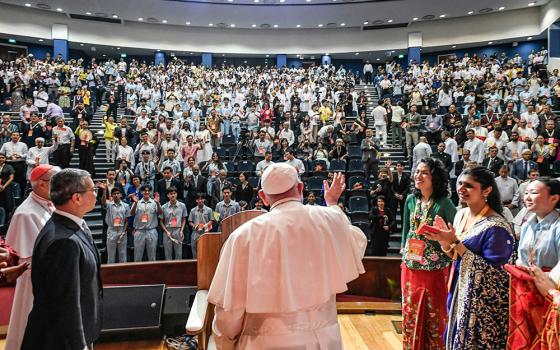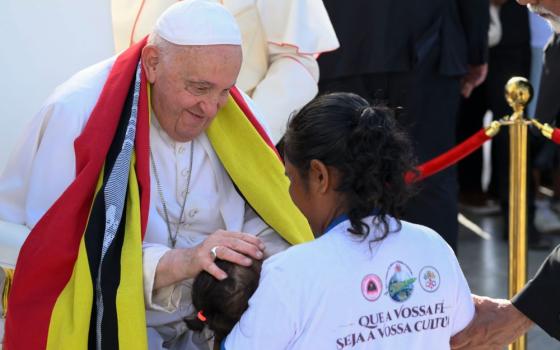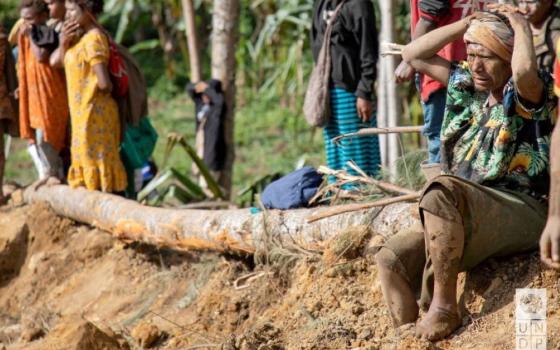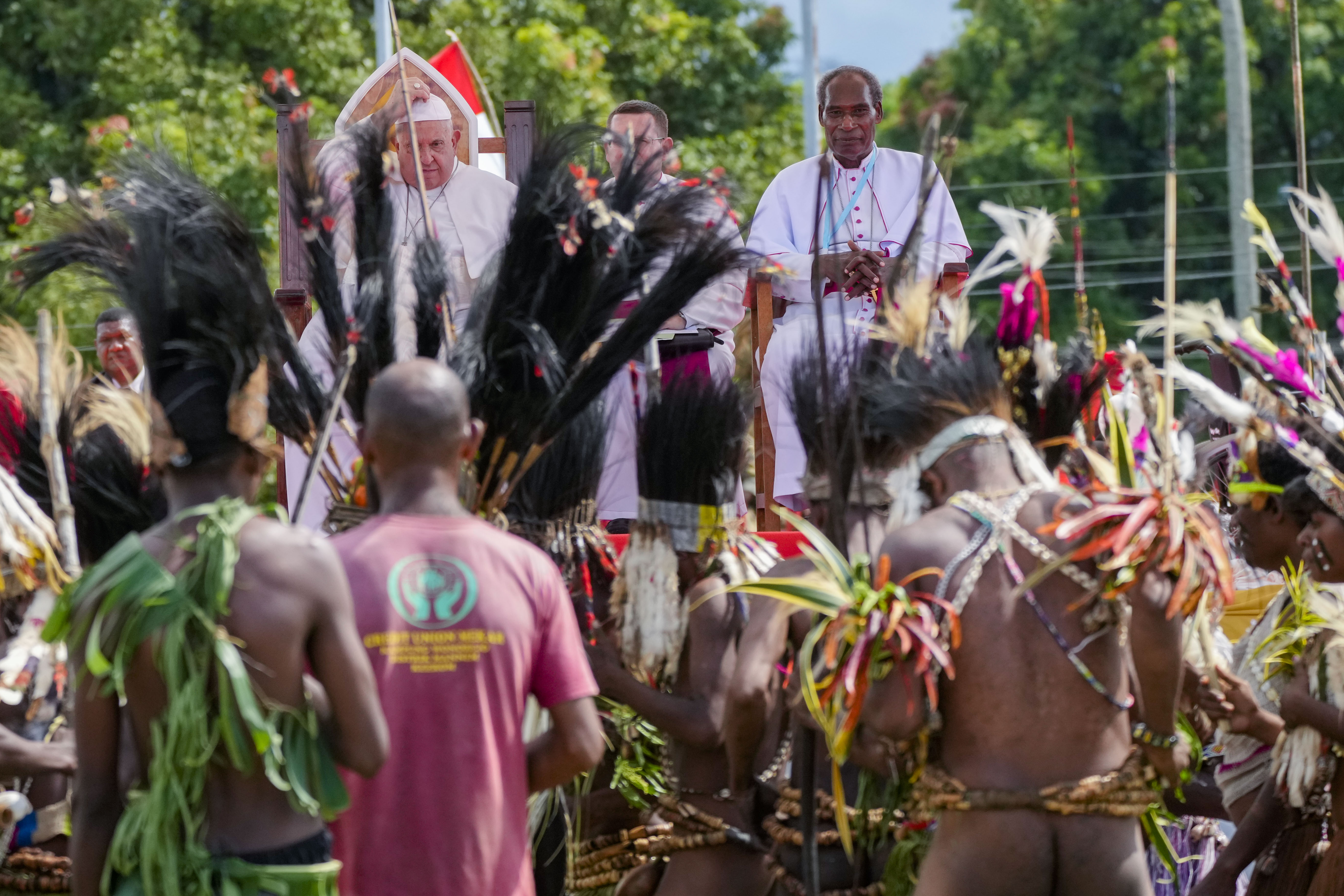
Pope Francis, with the Bishop of Vanimo Francis Meli, right, attends a meeting with faithful in Vanimo, Papua New Guinea Sept. 8, 2024. Pope Francis celebrated the Catholic Church of the peripheries on Sunday as he traveled to the remote jungles of Papua New Guinea, bringing with him a ton of medicine and toys and a message of love overcoming violence for the people who live there. (AP/Gregorio Borgia)
In the remote coastal town of Vanimo on the northwest edge of Papua New Guinea, Catholics often wait weeks or months for a priest to visit.
Except on Sunday, Sept. 8, when Pope Francis, carried by an Australian Air Force plane, landed on the edge of the jungle to go where no pope has ever visited to convey a heartfelt message to its nascent Catholic community: "You are doing something beautiful, and it is important that you are not left alone."
Catholicism first arrived here in Papua New Guinea in the middle of the 19th century but only reached this pocket of the country some 50 years ago. As the pope took in the sight of thousands of Catholics — many wearing colorful feather headdresses and grass skirts and surrounded by the tropical flora — he remarked that evoked images of the Garden of Eden.
For years, Francis has wanted to visit this distant region after learning about it from his fellow Argentine, the missionary priest Fr. Miguel De Lacalle of the Institute of the Incarnate Word, which has served the area for nearly three decades. Now, after years of correspondence with the community and a two hour flight from the capital of Port Moresby, Francis managed to pull off what many considered the most challenging visit of an already audacious 12-day trip through Asia and Oceania for the 87-year-old pontiff.
Advertisement
With a population of just over 11,000, some Catholics reported walking for several days to reach the meeting with the pope. While there was much jubilation at both their own arrival and that of the pope's, no one tried to mask the difficulties they face.
Steven Abala, a catechist, told the pope of the challenges of ministering in an area where Catholics wait weeks or months to see a priest or receive the sacraments.
"Most of us are missionary catechists who leave our homes to serve Catholics in other villages where there is no other catechist present," he said, before asking the pope for his continued prayers and blessing.
When he finished his testimonial, Abala presented the pope with a local feathered headdress, which Francis immediately donned.
Up next was 12-year-old Maria Joseph who fought back tears as she recounted her experience of living with the Institute Servants of the Lord Sisters at their Lujan Home for Girls. The sisters took her in at age two and supported her through multiple operations to correct a severe deformation in her legs.
"Now I can stand up straight and tall," she told the pope. "Even though I do not know my parents, the sisters have become my mothers and the other girls have become my sisters, and we live as a true family."
During his own remarks, Francis spoke candidly about the heartaches and hardships faced by the people there and the efforts by the country's Catholics to "put an end to destructive behaviors such as violence, infidelity, exploitation, alcohol and drug abuse, evils which imprison and take away the happiness of so many of our brothers and sisters."
"Let us remember that love is stronger than all this and its beauty can heal the world, because it has its roots in God," he told the crowd of an estimated 20,000 locals.
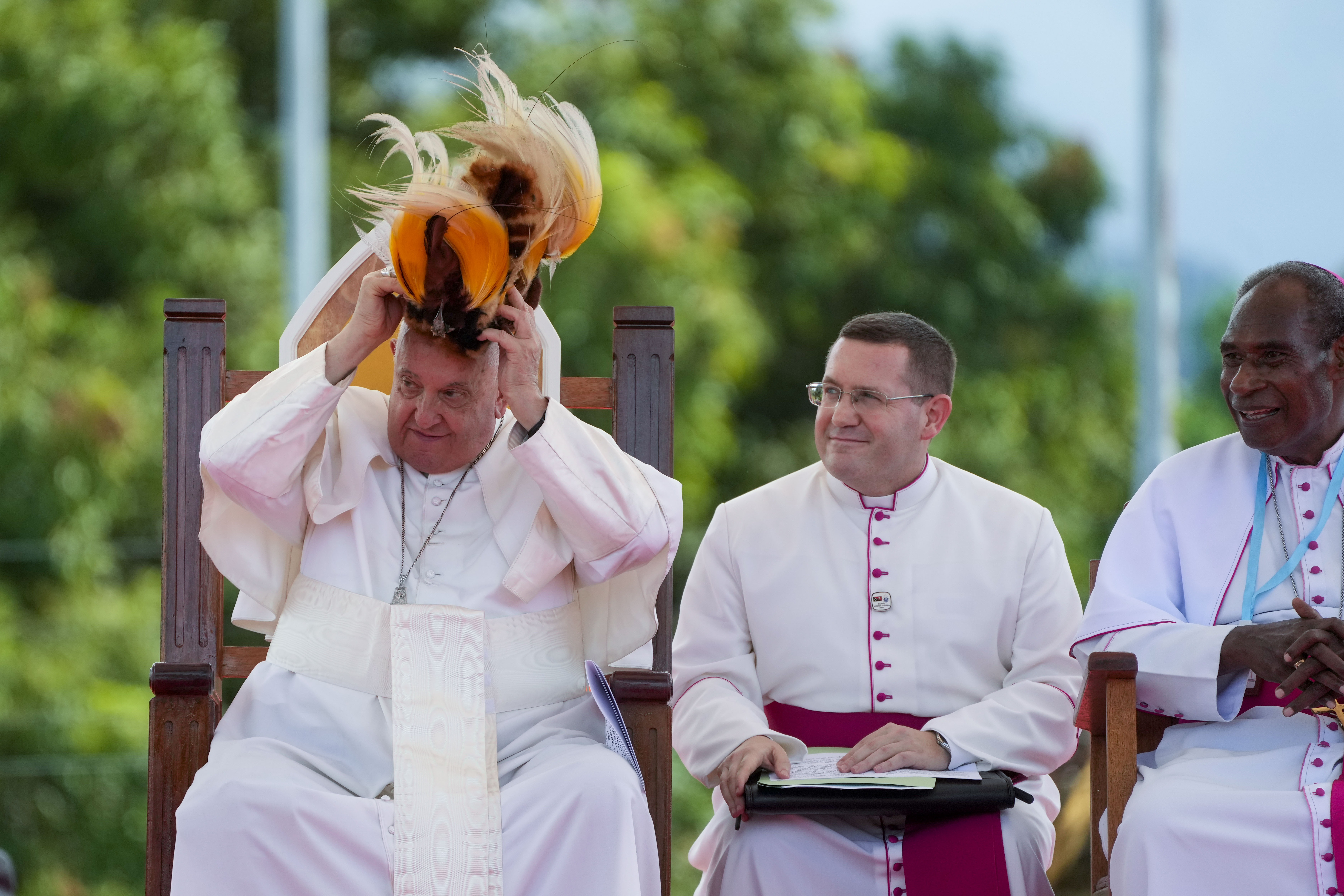
Pope Francis receives a traditional hat during a meeting with faithful in Vanimo, Papua New Guinea, Sunday, Sept. 8, 2024. Pope Francis celebrated the Catholic Church of the peripheries on Sunday as he traveled to the remote jungles of Papua New Guinea, bringing with him a ton of medicine and toys and a message of love overcoming violence for the people who live there. At right is Vanimo Bishop Francis Meli. (AP Photo/Gregorio Borgia)
Despite being home to tremendous natural resources, some 40% of the country lives in poverty, fueled by government instability, natural disasters and ongoing tribal infighting.
Throughout his three-day visit here, the pope acknowledged those difficulties, but repeatedly praised the country's diversity — home to over 600 tribes and more than 800 languages — and appealed to their shared Christian roots (while only 26% of the population identifies as Catholic, some 98% identify as Christian) to encourage them to work together for the common good.
"Love each other," was the pope's simple and direct message as he concluded his remarks in Vanimo.
While the effusive crowd reveled in Francis' presence, the missionary pope who has consistently emphasized that the church's peripheries are more important than its institutional center, took great delight at seeing the universality of the Catholic Church on full display in Papua New Guinea.
At a Mass earlier in the day at Port Moresby's Sir John Guise Stadium, the liturgy began not with the sound of bells, with the beating of drums and a tribal dance.
"We see Jesus going to territories on the peripheries," Francis told the crowd of 35,000 who turned out for the occasion. "This is the nearness of Jesus, who comes to touch our lives and remove every distance … by his coming Jesus announced peace to those who were far away."
Despite his brief stay and his looming departure on Sept. 9 for nearby Timor Leste, according to some of those on hand for the Mass, the pope's presence here was reminder of that closeness that will not soon be forgotten.
"It's the most exciting and significant moment in my life as a Catholic," said 48-year-old Dorothy Talia, who waited eight hours for the papal Mass to begin.
"When I saw him, it was full of grace," she added. "It was like Jesus had come."





